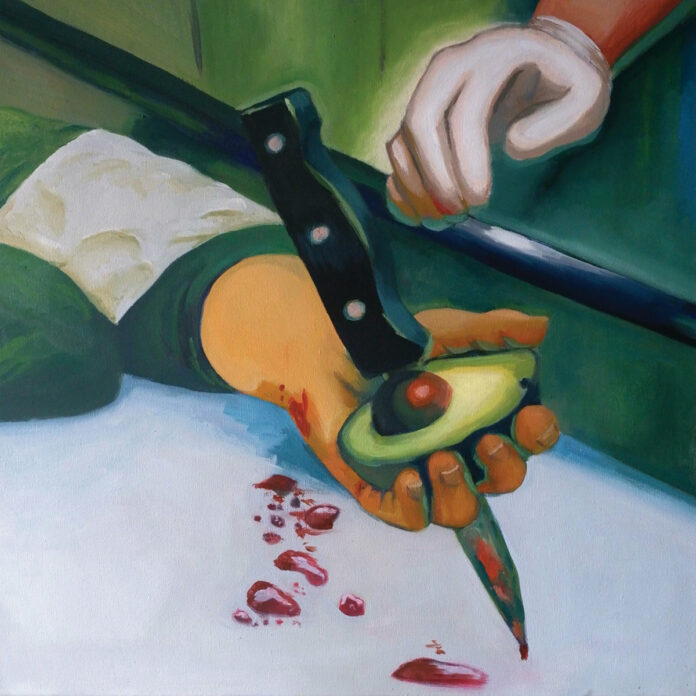In 2022, a year after Spirit of the Beehive released their knottiest, most abrasive record to date, bandmates Zack Schwartz and Rivka Ravede ended their romantic partnership. Last year’s i’m so lucky, the four-song EP that followed ENTERTAINMENT, DEATH, was not only a test as to whether the group could venture on but harnessed their manic approach to explore a wave of confounding emotions. Although the experiment proved successful, it sounded like a naturally transitional effort, a cathartic outpouring that would allow the unpredictable Philadelphia trio to carve out a new path forward. That this group – known for abstracting and corroding feeling, operating in a genre where “confrontational” is not only high praise, but the default – would follow it up with an actual breakup album did not seem particularly likely. But YOU’LL HAVE TO LOSE SOMETHING, their fifth album, isn’t another left turn so much as a continuation of what began with i’m so lucky – picking at the same wounds, magnifying the same fears. What if we really let the pain and horror sink in, it seems to ask, veered a little closer to the edge?
Spirit of the Beehive still make “confrontational” music, just less so – and never, unlike so many of their imitators, as an aesthetic choice. In promo materials, Corey Wichlin uses the phrase “less antagonistic,” though fans wary of the band going in a poppier direction should consider that one of the album’s stickiest hooks is saying “Goodbye to the void.” While it builds on the more polished, streamlined version of their sound that was introduced on i’m so lucky, the trio’s constant fascination with pop structure still doesn’t manifest as pure adherence to any kind of formula. If anything, it becomes more of an affective tool than a stylistic one. Against its glossy presentation looms the specter of death and the cruel passage of time, and the group’s familiar paranoia now sounds more like a descent into a world of evil. As the breakup at its core threatens the dissolution of so many other facets of reality, YOU’LL HAVE TO LOSE SOMETHING becomes an album about desperately clutching onto one’s humanity, yet ends up the band’s most human and emotionally resonant effort yet.
On the very first song, ‘THE DISRUPTION’, Deedee of MSPAINT chimes in to deliver an aspirational chorus that doubles as an exorcism, arriving just after a brief storm of power chords: “Break the spell, disenchant all the evil in your head!/ Rectify existential dread, you do not fear the dead!” But his proclamation is followed by an unnerving scream, suggesting that the band’s signature wickedness and ambiguity will keep creeping its way through. It’s there in the voice that struggles to be heard on ‘LET THE VIRGIN DRIVE’, which was originally written while touring behind ENTERTAINMENT, DEATH and lays out a morbid scene to prove it, except the arrangement is more beautiful than anything on that album. But for all its allusions to stalking, guns, and godly violence, YOU’LL HAVE TO LOSE SOMETHING suggests there’s often nothing more sinister and deadly than what’s right in front of us, inevitably: the mundanity of life, seasons changing. “I can’t stop time,” Schwartz admits on ‘1/500’, “But I want it to be on my side.” There’s a reason ‘SORRY PORE INJECTOR’ represents “daily rot” in the form of an almost-straightforward rock song, chugging along before drifting into something less tangible.
Mirroring the lives it deconstructs, YOU’LL HAVE TO LOSE SOMETHING has more than a few abrupt twists and rougher edges, made all the more enticing by its softer appearance, like the rhythm section that suddenly booms out of ‘THE CUT DEPICTS THE CUT’. The surprises are not only musical, but verbal, too; in ‘SORRY PORE INJECTOR’, it is the boldness of a confession that comes in the middle of nowhere: “If all the love is gone, then you can say what you want.” It’s this hypothesis, more than just the viability of their collaborative project, that Spirit of the Beehive tested on i’m so lucky and delve deeper into here. Some of the least chopped-up songs, the ones that tend to hold their shape – ‘I’VE BEEN EVIL’, the Ravede-penned ‘FOUND A BODY’ – almost scan as tender confessionals. But what lingers after listening to the album is less of an internal or intraband dialogue than bits of it that shine through as a kind of truth (“Resentment is a hill to die on”; “Devotion is a cancer”), memories that spin out your head at the precipice of catastrophe. For any of it to matter, though, you’ll have to listen close.

